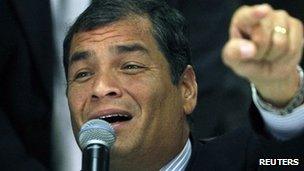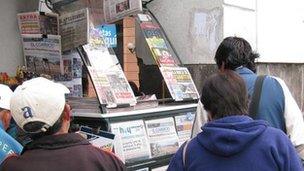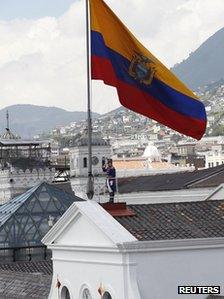Ecuador's Rafael Correa under fire for media laws
- Published

President Correa argues that Ecuador's media try to assume a political role
Rafael Correa has been Ecuador's president since 2007 but it is probably fair to say he has never had as much international attention as in recent weeks.
In January, several major US newspapers took a swipe at him in separate editorials.
"President Rafael Correa of Ecuador is leading a relentless campaign against free speech," said The New York Times. , external
The Washington Post, external said the president ought to be known for "the most comprehensive and ruthless assault on free media under way in the Western Hemisphere".
According to various international rights organisations, 2011 was a bad year for freedom of speech in Ecuador, and 2012 does not bode well.
Following a change to the current electoral law, which comes into effect on 4 February, journalists will face restrictions when reporting on the forthcoming campaign for the 2013 presidential election.
The new article prohibits media from "either directly or indirectly promoting any given candidate, proposal, options, electoral preferences or political thesis, through articles, specials or any other form of message".
Several Ecuadorean journalists have said the new regulations amount to censorship.
"It is clear that this is an affront to basic rights," said Ecuadorean media freedom organisation Fundamedios.
Popular leader
But President Correa is adamant that the new legislation is vital.
"Media cannot be political actors," he said during one of his weekly TV and radio broadcasts.
"We have to put an end to the illegitimate, immoral political power that certain media have. All they do every day is a political campaign against the government."
Mr Correa has not yet said whether he will run in the election, currently scheduled for January 2013.
With approval ratings close to 80%, according to a polling firm favoured by the government, he seemingly has the largest support base among potential candidates.

The battle between the president and some media outlets has ended up in court
Mr Correa, who is popular in Ecuador thanks to his social programmes that support, among others, the poor and the disabled, has often said media are his "greatest enemy" and a major obstacle in implementing reforms.
In Ecuador, private media have traditionally served the interests of their owners - powerful groups with strong economic interests.
Mr Correa says those elites do not want wealth to be fairly distributed across the country.
Under Mr Correa's leadership, the government has brought in laws to limit media concentration.
In 2008 a number of media outlets, including two TV stations, were seized from bankers on the grounds of corruption.
The government went from controlling only one radio station to running a large network of media, which have the obligation of broadcasting the president's weekly radio and TV shows.
Although the growth of public media is important, the current landscape is far from balanced, according to investigative journalist Juan Carlos Calderon.
"The president has decided to demonise private media, even if it is a legitimate activity, regulated by the constitution," Mr Calderon says.
"The president has created this polarisation. We journalists are the meat in the sandwich."
Legal spotlight
Mr Calderon is facing a libel trial following the 2010 publication of a book, Big Brother (El Gran Hermano), which detailed government contracts that benefited the president's older brother, Fabricio.
President Correa, who denied knowledge of the contracts and had them cancelled when they came to light, filed a $10m (£6.4m) lawsuit against Mr Calderon and his co-author for attempting to discredit his good name.

Rafael Correa's five years in office have seen a raft of changes in the country
For his part, Fabricio Correa has said that all the contracts were the result of public tender.
In 2011, Mr Correa filed another libel suit against El Universo newspaper after former editor Emilio Palacio wrote a column in which he called the president a "dictator."
The newspaper's three directors and Mr Palacio were sentenced to three years in jail with fines totalling $40m.
Their delayed appeal is expected to be heard in February.
If the conviction is upheld, El Universo, one of the oldest newspapers in the country, might have to declare bankruptcy.
In another case, Jaime Mantilla, director of Hoy newspaper, was sentenced in December to three months in jail for failing to reveal the sources of a series of reports that Pedro Delgado, current head of the central bank, and Mr Correa's cousin, said were offensive.
International criticism against President Correa has grown in relation to the growing tension between the executive and representatives of the country's media.
In a 2011 report, the UN's cultural body Unesco , externalstressed the need to repeal libel laws and to modernise the rules regulating free expression in Ecuador.
The Organization of American States' Special Rapporteur for Freedom of Expression, external has also voiced concern.
In response, President Correa has called for the remit and the financing of the rapporteur's office to be reviewed.
He has said that the OAS needs a new human rights forum that does not automatically follow the lead of the United States.
"Having successfully run roughshod over the democratic institutions within his own country, Correa is now seeking to employ the same tactics outside his borders," said Joel Simon, executive director of the US-based Committee to Protect Journalists, in a recent opinion piece in the Miami Herald. , external
While Mr Correa has repeatedly demonstrated that he can deal with opposition at home, this year seems likely to show if he is equally well able to deal with critics abroad.
- Published24 January 2012
- Published27 February 2013